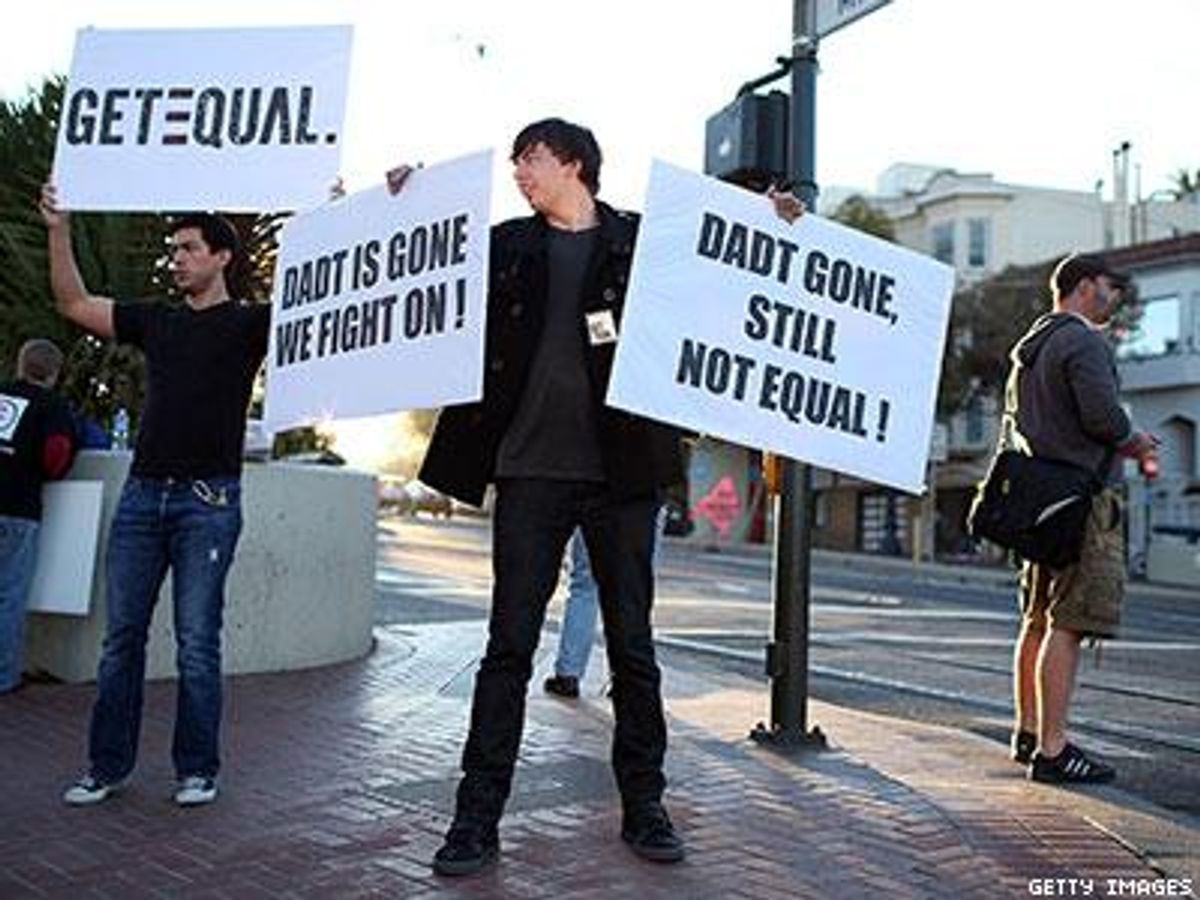In the fall of 2010, there was an unusual meeting at the Pentagon. Fifteen gay men and lesbians signed in to "The Building" on a special register so that after their visit the names could be deleted and their military partners would not be exposed under the "don't ask, don't tell" policy. They were escorted to a meeting room where they told their stories to senior members of the working group tasked to study DADT.
"I can't go on base to pick up our daughter from day care."
"When my husband had surgery, I couldn't be with him at the military hospital -- I couldn't even go on post to pick him up."
"We trained our 5-year-old daughter not to say that Mommy is in the Army, because her teachers know that she has two moms."
"When he's reassigned, they won't pay to move me, and I have to find my own job before I can join him. We need both paychecks; I can't shop in the PX or commissary."
"When he was in Iraq, we set a time every day to talk -- if he missed it, I was terrified, because I knew no one would call me if... "
I've been told by many attendees that this was a turning point. Officers who'd hesitated to support DADT repeal were stunned by the stories: They thought they understood what gay and lesbian service members gave up, but the sacrifices their partners (not able to be spouses) made had never occurred to them. One mumbled that, under those conditions, his wife would have forced him to leave the military years before.
We may have won the fight for equality in the military because of our marriages. And we may have won the fight for marriage equality because of the military. Americans -- from the president to your next-door neighbor -- changed their minds about marriage because they saw real couples, and heard their stories.
And importantly, because of DADT repeal, they saw soldiers, sailors, marines, airmen, Coast Guardsmen. People like Marine Captain Matthew Phelps proposing to his future husband, Ben Schock. Like Army Brig. Gen. Tammy Smith having her wife Tracey Hepner pin on her star. Like Chief Warrant Officer Charlie Morgan, laid to rest in a military funeral, the general gently presenting a folded military flag to her wife, Karen. Like Stephen Snyder-Hill -- the deployed soldier booed by Republicans during the debates -- and his husband, Joshua, who became visible advocates for marriage rights in Ohio.
Because of DADT repeal, service members were on the front lines of the marriage equality fight. Denying marriage to gays might have felt a bit uncomfortable, but it became intolerable for many when it came to those who volunteered to defend their country in the uniform of the United States military.
Following repeal, Servicemembers Legal Defense Network and OutServe were joined by the Military Partners and Families Coalition and the American Military Partners Association in fighting for marriage rights nationally as well as locally, in the courts, and in the media. And those battles created new activists, because while there is a strong military tradition against political activism, there is an equally strong tradition of fighting injustice.
In conservative North Carolina, Fort Bragg saw Ashley Broadway, wife of LTC Heather Mack, named Military Spouse of the Year ... and Staff Sergeant Tracey Johnson mourning the death of her wife, Sgt. Donna Johnson, in Afghanistan. It takes a hard heart to insist on "traditional marriage" in the face of such courage.
Fewer than 1 percent of Americans serve in the military, and we have asked much of them, especially over the past decade. And perhaps because of that, they are a powerful symbol. Seeing LGB people in uniform changed the dynamic of LGB rights, and it changed the landscape for marriage equality.
So are gay, lesbian, and bisexual service members done? Is our work for equality and justice over? It seems to me that there are still issues where we can make positive change for LGBT Americans. In fact, members of our own community are still left out: An estimated 15,000 transgender people currently serve in the armed forces under outdated medical regulations that form their own version of "don't ask, don't tell." And yet, despite the lessons of DADT repeal opening up other rights, some in the community still argue that we shouldn't be working on behalf of our service members because of other priorities. Seriously? Once the Marine Corps accepts its transgender members, what is everyone else's excuse?
In 2009 DADT repeal was well down the list of LGBT political priorities. Veterans made it happen anyway, and good thing we did, because the whole movement benefited. As we continue to work toward full equality and full citizenship, let's not forget our troops.
BRENDA "SUE" FULTON is an Army veteran and the serves on the Board of SPARTA, an organization for LGBT service members. She currently serves on West Point's board of visitors by presidential appointment, and she and her wife, Penny, were the first same-sex couple married in the military academy's cadet chapel.


















































































